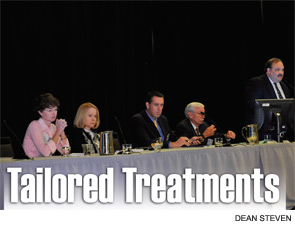
Explore This Issue
February 2011SCOTTSDALE—Otolaryngologists treating vocal fold paralysis have many options from which to choose, but the best choice depends on the wants and needs of the patient, a panel of experts said here at the Triological Society’s Combined Sections Meeting on Jan. 28.
The panelists discussed the fine points of vocal fold injection, medialization laryngoplasty, reinnervation of the vocal folds and arytenoid adduction. The panelists said that they don’t perform one procedure to the exclusion of the others, noting that sometimes a patient can have more than one good option, although certain kinds of situations can lend themselves more to one kind of procedure than another.
Vocal Fold Injection
Clark Rosen, MD, director of the University of Pittsburgh Voice Center in Pa., said vocal fold injection can augment the anterior two-thirds of the vocal fold and can be adjusted according to how much augmentation is wanted.
“Over the years, things have changed dramatically,” Dr. Rosen said. “We now have more and more access to new materials, most of them, in all honesty, for the cosmetic injectable world. The nice thing about these materials is now we have materials with different durations, and most of them can be used through a finer-gauge needle, which significantly facilitates in-office local anesthesia.”
But injections cannot close the posterior third of the vocal fold, cannot address a vocal fold that is too short, cannot medialize a lateralized vocal fold or, in most cases, provide a permanent fix, Dr. Rosen said. The effects of an injection can last from about two months to two years, although lipo injections are permanent.
Dr. Rosen said it is particularly beneficial to keep the patient awake during the procedure. “The ability to monitor vocal fold closure and voice quality with real-time feedback is quite helpful and important,” he said.
Medialization Laryngoplasty
Gaelyn Garrett, MD, medical director of the Vanderbilt Voice Center in Nashville, said she uses injections for temporary augmentation, medialization laryngoplasty for long-term and permanent improvements and arytenoid adduction to enhance fold positioning during medialization. Dr. Garrett said it is important, while performing medialization, to keep in mind the complex movement of the larynx.
Leave a Reply